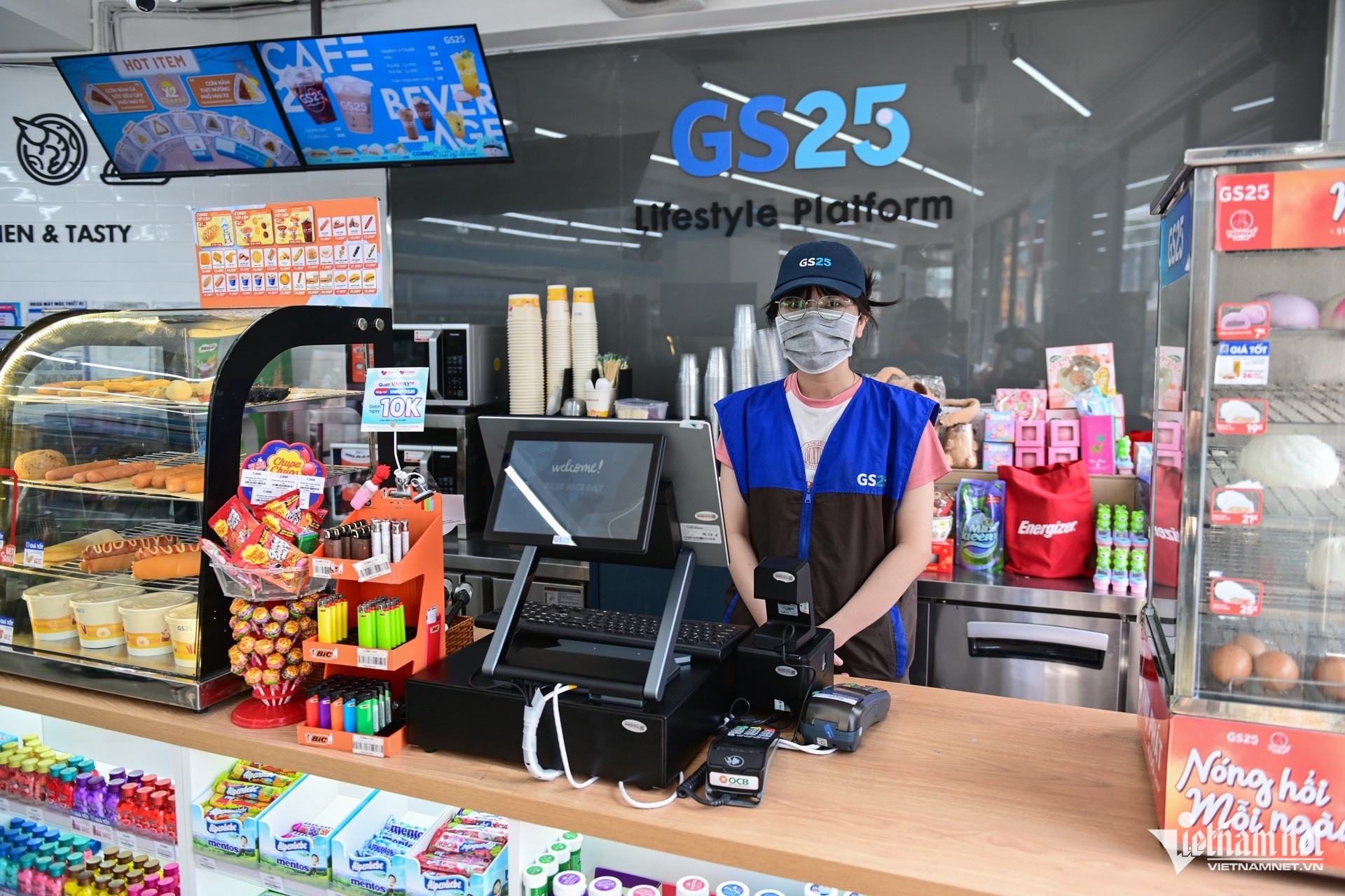
GS25 aggressively expands its convenience store network in Vietnam. (Photo: Nguyen Hue)
The South Korean convenience store chain GS25 has officially entered Hanoi, marking a significant expansion in Vietnam. With this move, Circle K is no longer the sole dominant player in the northern convenience store market, intensifying competition in an already fierce industry.
Starting March 14, GS25 simultaneously opened six stores in Hanoi, following its success in Ho Chi Minh City. After securing a strong foothold in the southern market, the Korean retailer is now looking to expand its presence nationwide.
GS25 and 7-Eleven intensify competition in Hanoi’s convenience store market
Founded in 1990, GS25 operates over 12,000 stores across South Korea. It first entered Vietnam in 2018, launching its debut store in Ho Chi Minh City. The brand primarily targets young consumers, offering a mix of convenience and Korean-style ready-to-eat products.
Currently, GS25 operates more than 200 stores in Vietnam, mainly concentrated in Ho Chi Minh City, Can Tho, Binh Duong, Ba Ria - Vung Tau, Dong Nai, and Tien Giang. The company has set an ambitious goal of opening 2,500 stores nationwide within the next decade.
Before GS25’s expansion, 7-Eleven had also hinted at plans to launch in Hanoi, marking its first northern expansion since entering Vietnam in 2017. Despite initial ambitions of opening 1,000 stores within ten years, 7-Eleven’s expansion has been slower than expected, with only around 80 stores in Vietnam so far.
Another formidable competitor, Ministop, a Japanese convenience store chain owned by AEON, has operated in Vietnam since 2015. However, Ministop has yet to establish a presence in northern Vietnam, focusing its 191 stores in Ho Chi Minh City, Binh Duong, and Long An.
Circle K no longer dominates Hanoi’s convenience store market
For years, Circle K has been the dominant convenience store chain in Hanoi, attracting young consumers with its 24/7 operations and modern shopping experience. More than just a retail outlet, Circle K stores have become popular social spaces for students and young professionals.
Currently, Circle K operates over 190 stores in Hanoi, with additional locations in Thai Nguyen, Hung Yen, Bac Ninh, Hai Phong, and Quang Ninh. However, with GS25 and 7-Eleven entering the northern market, Circle K now faces stronger competition.
As of 2024, Vietnam has approximately 1,374 convenience stores, with Ho Chi Minh City leading the market. The industry is dominated by foreign brands, with Circle K holding the largest market share. In 2023, Circle K accounted for 38% of Vietnam’s convenience store revenue, followed by Ministop (15%), GS25 (14%), Family Mart (12%), and 7-Eleven (8%).
The convenience store sector is one of the fastest-growing retail segments in Vietnam. According to industry forecasts, the market is expected to expand by $226.4 billion, with a compound annual growth rate (CAGR) of over 13% from 2023 to 2028.
Survival challenges in Vietnam’s convenience store industry
Despite its rapid growth, Vietnam’s convenience store market remains highly competitive, especially in northern regions. Over the years, many international brands have struggled to sustain operations and were forced to exit the market.
Family Mart, a Japanese convenience store chain, entered Vietnam in 2009 through a joint venture with Phu Thai Group. However, after continuous losses and failed restructuring efforts, the joint venture collapsed in 2013, leading to a complete acquisition by Thailand’s B’s Mart.
Another major failure was Shop&Go, which at one point operated 87 stores across Vietnam. Despite once being the largest convenience store chain in the country, it suffered massive financial losses. In 2019, Shop&Go was sold to VinCommerce for just $1, marking one of the most dramatic exits from the market.
At its peak in 2013, Shop&Go had over 100 stores, far ahead of competitors at the time. However, by 2016, the company reported revenues of 267 billion VND ($10.7 million) but suffered nearly 40 billion VND ($1.6 million) in losses. Its cumulative losses reached 205 billion VND ($8.2 million) by the end of 2016, despite having only 1.27 billion VND ($51,000) in charter capital.
Before being sold for $1, Shop&Go attempted various business models, including franchising and converting small grocery stores into convenience stores. However, fierce competition and inefficient operations made it impossible to sustain.
The intense competition in Vietnam’s convenience store sector means that companies must operate efficiently or face closure. A representative from Cua Hieu & Suc Song JSC, which previously managed a convenience store chain, stated that the retail market is far more challenging than initially anticipated, making it difficult for underperforming brands to survive.
Industry experts predict that competition among convenience store chains will continue to intensify as the market offers substantial growth potential.
Duy Anh